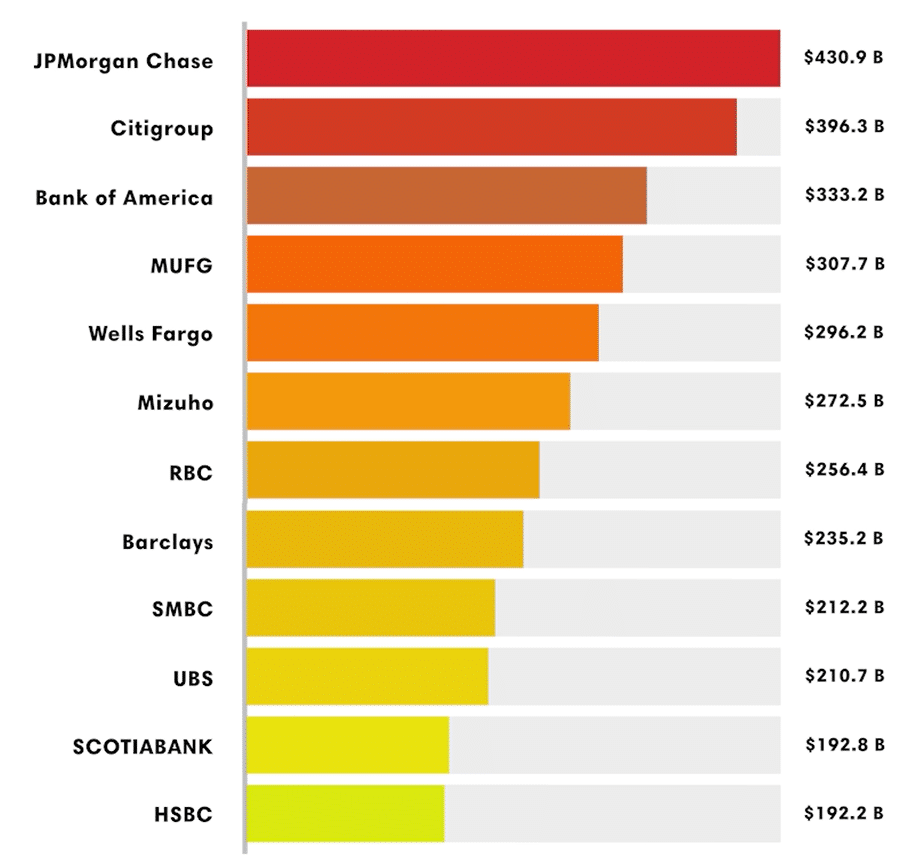How UBS finances the world’s oil and gas expansion
UBS talks a big game on climate while supporting the fossil fuel expansion of oil majors like ExxonMobil (photo Miriam Künzli/Greenpeace)
“Our ambition is to be a global leader in sustainability”, UBS claims on its website. This is “why we want to support our clients in the transition to a low-carbon world”. In practice, new documents reveal that the Swiss banking giant is underwriting some of the world’s biggest developers of fossil fuel expansion.
According to the latest Banking on Climate Chaos report, UBS is one of the world’s leading fossil fuel financiers, with $211 billion in total support since the Paris Agreement was signed. This exposure makes UBS the world’s tenth biggest fossil fuel financier for the 2016-23 period, and the second biggest in Europe after Barclays. UBS has offered billions of dollars in finance to carbon majors such as BP, Gazprom, Petrobras, Saudi Aramco, Shell and Woodside Energy, among others.
The Dirty Dozen fossil fuel financiers, 2016-23 (Banking on Climate Chaos)
Going forward, UBS asserts it wants to be a climate leader. The bank joined the Net Zero Banking Alliance (NZBA) and last year, defined an ambitious target to “reduce absolute financed emissions” associated with its fossil fuel lending by 70% during the 2021-30 period. According to Reclaim Finance, this is the most ambitious target among all NZBA members.
Yet while it looks ambitious, the UBS target is highly selective and somewhat misleading. Most fossil fuel expansion projects are not financed through loans, but through general corporate finance such as bond issuances. And this type of finance is not covered by the bank’s emission reduction target.
At the end of last week, ExxonMobil filed a prospectus supplement for a $172 million bond, to be used for “general corporate purposes”, with the US Securities and Exchange Commission. The bond will only mature in 2074 – a full 50 years from now. As the vigilant watchdogs at Reclaim Finance noticed, the book runners, which will market this bond to potential investors, include UBS as well as Morgan Stanley, Royal Bank of Canada and Deutsche Bank.
Interestingly, a previous filing included Citigroup as a book runner for this bond but not UBS. It appears that the Swiss bank stepped in and offered its services to the oil major once Citigroup stepped out.
As Reclaim Finance comments, this bond is “completely incompatible with the banks' net-zero objectives”. According to Oil Change International (OCI), ExxonMobil is “one of the largest corporate climate polluters in history”, with cumulative CO2 emissions of 55 billion tonnes. Worse, the company plans to increase its oil production from last year’s 3.7 million barrels per day to 4.2 million barrels by 2027. ExxonMobil has no plans to reduce, let alone phase out its oil and gas production. Its climate plans are “grossly insufficient’ on all ten criteria which OCI uses to assess such plans.
The support UBS offers ExxonMobil for the expansion of its fossil fuel production is not an exception. Australian campaign group Market Forces revealed last month that Woodside Energy is currently planning to issue a 10-year and/or 30-year bond offering. Woodside is Australia’s largest gas producer and like ExxonMobil, has massive expansion plans. With $2.6 billion in support, UBS was the company’s largest financier during the 2016-23 period. The Swiss bank has again been named as one of the four book runners which will market the new bond.
According to Reclaim Finance, UBS in April 2022 also underwrote $150 million of a bond by the Korean power utility KEPCO. KEPCO was planning the construction of five new coal power plants with a total capacity of 8,300 megawatt in Korea, Indonesia and Vietnam at the time. Neither the ExxonMobil nor the Woodside or KEPCO bonds are compatible with a credible net-zero emissions strategy.
UBS doesn’t limit its support for fossil fuel expansion to bond issuances. In March 2024 Greenpeace analyzed the voting record of ten large asset managers operating in Switzerland in regard to important climate resolutions during the previous year. Among all the asset managers, UBS and Blackrock performed the worst by supporting only one out of ten resolutions each. As an example, asset managers Pictet, Credit Suisse, Swisscanto and Swiss Life rejected the election of ExxonMobil’s board chair at the oil giant’s annual meeting in 2023. Who voted for the controversial board chair? You guessed it: UBS, in addition to AXA and Blackrock.





